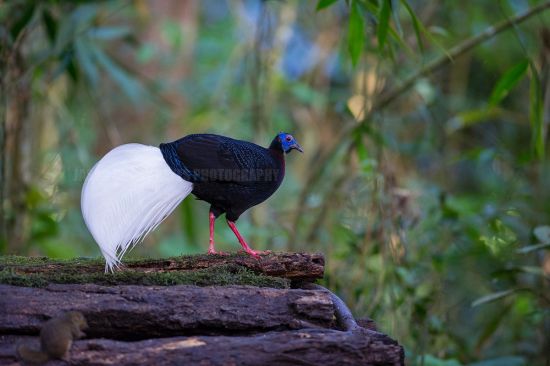Sbarnhardt (talk | contribs) (Amend GSearch with new combined search, Add GSearch checked template) |
(new photo of females; shortened GSearch) |
||
| Line 11: | Line 11: | ||
*Crimson-red legs<br /> | *Crimson-red legs<br /> | ||
'''Female''' - smaller | '''Female''' - smaller | ||
| + | [[File:Bulwer's Pheasant (females) by horukuru.jpg|thumb|350px|right|Photo © by {{user|horukuru|horukuru}}<br />Mount Trusmadi, Sabah, [[Malaysia]], 12 December 2022]] | ||
*Dark mottled rufous-brown | *Dark mottled rufous-brown | ||
*Fine black vermiculations | *Fine black vermiculations | ||
| Line 31: | Line 32: | ||
{{ref}} | {{ref}} | ||
==External Links== | ==External Links== | ||
| − | {{GSearch| "Lophura bulweri" {{!}} "Bulwer | + | {{GSearch| "Lophura bulweri" {{!}} "Bulwer Pheasant"}} |
{{GS-checked}} | {{GS-checked}} | ||
[[Category:Birds]] [[Category:Lophura]] | [[Category:Birds]] [[Category:Lophura]] | ||
Revision as of 12:53, 28 January 2023
- Lophura bulweri
Identification
77-80cm
Male
- Glossy blue-black body
- Bluish spots on tips of upperpart feathers
- Brilliant blue facial skin and wattles
- Purple sheen to the throat and upper breast
- White tail
- Crimson-red legs
Female - smaller
- Dark mottled rufous-brown
- Fine black vermiculations
- Dull bluish facial skin
- Red legs
Distribution
Interior Borneo.
Taxonomy
This is a monotypic species[1].
Habitat
Submontane forests.
Behaviour
Diet
The diet includes fruit, bulbs, tubers, ants, termites, small crickets, worms, crayfish, and a variety of seeds.
Breeding
The 2-5 eggs are incubated for 24 to 25 days.
References
- Clements, J. F., T. S. Schulenberg, M. J. Iliff, T. A. Fredericks, J. A. Gerbracht, D. Lepage, S. M. Billerman, B. L. Sullivan, and C. L. Wood. 2022. The eBird/Clements checklist of Birds of the World: v2022. Downloaded from https://www.birds.cornell.edu/clementschecklist/download/
- ARKive
Recommended Citation
- BirdForum Opus contributors. (2024) Bulwer's Pheasant. In: BirdForum, the forum for wild birds and birding. Retrieved 20 May 2024 from https://www.birdforum.net/opus/Bulwer%27s_Pheasant
External Links
GSearch checked for 2020 platform.





